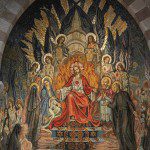I’ve decided to start doing devotions as part of my blog. I wanted to start with the monster-psalm — 119, which has 176 verses, taking on one section at a time. So here is Psalm 119:1-8:
Happy are those whose way is blameless,
who walk in the law of the Lord.
Happy are those who keep his decrees,
who seek him with their whole heart,
who also do no wrong,
but walk in his ways.
You have commanded your precepts
to be kept diligently.
O that my ways may be steadfast
in keeping your statutes!
Then I shall not be put to shame,
having my eyes fixed on all your commandments.
I will praise you with an upright heart,
when I learn your righteous ordinances.
I will observe your statutes;
do not utterly forsake me.
This psalm shows how the ancient Israelites saw the law, or torah, of the Lord as a gift rather than a burden. Enlightenment thinkers turned “law” into an oppressive thing by describing it as a sacrifice of freedom that you make in exchange for not getting punished. Laws to us are a long list of things you can’t do and the penalties you accrue if you break the rules, which is very different from the Biblical words that are translated as “law” in English: torah (Hebrew) and nomos (Greek). Torah and nomos refer to the principles that create harmony and order within our world. When these principles are violated, communities and ecosystems are thrown into chaos, so law often requires some means of reinforcement, but rewards and punishments are not intrinsic to the meaning of law itself.
Naming how modernity has skewed our understanding of law can help us not to automatically presume that this psalm is saying people are happy when they follow God’s law because they don’t get punished. Actually, what this psalm says is that people are happy simply because following God’s law makes them happy. There is no talk of rewards or punishments. The only consequence of not following the law in this psalm is being “put to shame.” This is a psalm written for people who don’t need punishments and rewards as motivational tools because they “seek God with their whole heart.”
So how do we talk about “walking in the law of the Lord” in “post-punishment” terms? As I was walking church this morning, it hit me that walking in the law means to live poetically. Poetry is an art that is built upon laws. This is more obvious in overt poetry forms like the sonnet, villanelle, and sestina. But even free verse contains a subtle, intensely complex calculus behind the placement of words into combinations of alliteration, word-play, metaphor, onomatopoeia, etc. You can always tell the difference between a free-verse poem that is simply a dump of adolescent angst and a free-verse poem that is governed by acutely tuned sensibilities.
The shameful reality about all the trashy things that people do when they don’t walk in the law of the Lord is that they’re not just wrong; they’re unimaginative. Sin is an unimaginative waste of our energy. It’s reacting to situations and relationships in the easiest and most uncreative ways possible instead of allowing God to teach us through His law how to create beauty through how we treat ourselves and other people. Following the law of the Lord is an elegant, imaginative dance that gives people a reason to enjoy life. So don’t go stomping around in clunky, boring prose; live poetically; seek God’s Torah.











